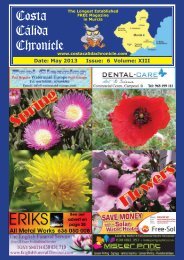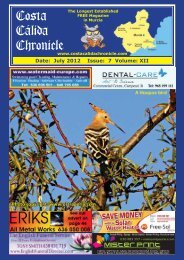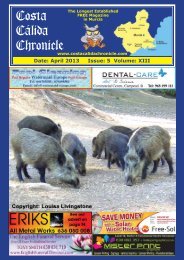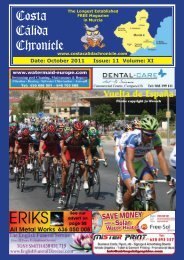Costa Cálida Chronicle - Costa Calida Chronicle
Costa Cálida Chronicle - Costa Calida Chronicle
Costa Cálida Chronicle - Costa Calida Chronicle
Create successful ePaper yourself
Turn your PDF publications into a flip-book with our unique Google optimized e-Paper software.
In association with <strong>Costa</strong> Cálida International Radio and www.angloINFO.com<br />
IMPOR-<br />
T A N T<br />
SUMMER<br />
GARDEN<br />
CARE<br />
By<br />
Clodagh<br />
and Dick<br />
H a n d -<br />
scombe,<br />
practical<br />
gardeners and authors living in Spain for<br />
twenty five years.<br />
Spanish summers are hot and gardens<br />
need some extra care to ensure that they<br />
are colourful and survive the scorching<br />
southerly winds. This article indicates what<br />
needs to be done.<br />
Keeping Plants Alive<br />
Keeping plants alive consists of four things:<br />
1. Keeping the roots of plants constantly<br />
damp both in the garden<br />
and containers. Whether you water<br />
with a drip irrigation system,<br />
hose or watering can, this can be<br />
difficult to judge unless you dig a<br />
hole to check what layers are dry<br />
and at what level the soil is still<br />
moist. The latter is time consuming,<br />
difficult to do in closely planted<br />
beds and judgemental as what one<br />
person regards as damp another<br />
person may regard as wet and it’s<br />
a hard lesson to learn when your<br />
favourite plants keel over and die.<br />
The solution is to purchase a soil<br />
moisture meter. Typically they have<br />
a probe to push into the earth in a<br />
garden bed or the compost in a pot<br />
down to 15 centimetres of depth<br />
and do not need a battery to operate<br />
them. The best have a second<br />
probe that measures the acidity of<br />
Page 26<br />
the soil or compost. Ours also has a<br />
light meter which is useful in checking<br />
the amount of light reaching to<br />
the back of a naya or the shade of<br />
a tree where you are considering<br />
placing pot plants.<br />
2. Placing tender plants that are easily<br />
shrivelled in full sun or by blazing<br />
hot winds in semi, dappled or<br />
full shade and watering twice a day<br />
if necessary. This includes annual<br />
herbs such as parsley or basil.<br />
3. Keeping roots cool by shading them<br />
with slabs of rock or mulches of<br />
compost or bark chippings.<br />
4. Ensuring that you plant up your<br />
garden with plants that are naturally<br />
drought resistant and capable<br />
of slowing down their growth and<br />
moisture requirements during the<br />
hottest weeks.<br />
Cacti and succulents are among the most<br />
draught resistant plants, but there are<br />
many others as indicated in Part Four of<br />
‘Your Garden in Spain – From Planning<br />
to Planting’ (ISBN 978-84-89954-670<br />
Keeping the Garden Colourful<br />
Stimulating prolonged or repeat flowerings<br />
consists of watering as above, plus regular<br />
dead heading as soon as flowers start to<br />
dry up, to prevent the plants from using<br />
energy to produce seeds rather than new<br />
flower buds.<br />
Stimulating plants to flower continuously<br />
or again requires that you dead head as<br />
soon as flowers have finished to prevent<br />
seeds being formed, watering as above<br />
and minimising the use of feeds high in nitrogen.<br />
Most plants will grow and flower<br />
well without regular feeding, but should<br />
you consider it necessary use a feed high<br />
in potash rather than nitrogen. Regular<br />
feeding with the latter may result in excessive<br />
greenery at the expense of flowers.<br />
Fruit Trees Also Need Care<br />
It is essential that fruit trees are watered<br />
thoroughly so that their deepest roots are<br />
kept constantly damp enabling the fruit<br />
to develop continuously. Intermittent watering<br />
can result in splitting fruit, major<br />
fruit falls or insect and fungal attacks. If<br />
you planted your fruit trees in previously<br />
enriched soil and gave the trees a spring<br />
feed, a summer feed is not essential.<br />
The Vegetable Plot can still be Productive<br />
Provided they are frequently watered, fruit<br />
vegetables such as tomatoes, peppers,<br />
squash and melons swell and ripen well<br />
in sunny weather. Root vegetables such<br />
as peanuts, carrots and beetroot will grow<br />
and keep well in the soil if kept damp, but<br />
quick growing radishes will soon go to seed<br />
if not harvested when young. As the summer<br />
warms up flowering artichokes will<br />
stop producing and July is a good time to<br />
sow seeds to produce broccoli plants for<br />
planting out in the autumn, however, leaf<br />
vegetables are best shaded for at least<br />
part of the day to keep them growing without<br />
going to seed. Weeds will be less of a<br />
problem than in the spring, but will need<br />
keeping under control by hoeing and adding<br />
to the compost heap. It’s a good idea<br />
to dampen the compost heap each month<br />
to prevent it from drying out.<br />
The above actions should help you enjoy a<br />
colourful and productive summer garden,<br />
but do watch the garden for unexpected<br />
problems. Before the summer, read chapter<br />
6.16 ‘Be a plant detective’ in our<br />
book ‘Your Garden in Spain’ which lists<br />
fifty ways of killing plants- many of them<br />
related to summer conditions.<br />
Clodagh and Dick at Homes Garden<br />
and Outdoor Living Show<br />
On Monday/Tuesday 22 and 23 May Dick<br />
and Clodagh Handscombe, Spain’s best<br />
known expatriate gardening authors, will<br />
be giving talks and answering any questions<br />
you have on the Gardening in Spain<br />
on stand No 43 at the Homes Garden and<br />
Outdoor Living Show open from 11am<br />
until 8pm at the Castle at San Miquel de<br />
Salinas just south of Torrevieja.<br />
Three talks<br />
will be given<br />
each day;<br />
at 12.30<br />
and 16.30<br />
they will<br />
talk about<br />
‘Achieving<br />
a Good<br />
Garden in<br />
Spain’. The<br />
third talk will<br />
be at 15.30<br />
each day<br />
and will be<br />
about ‘Living<br />
Well from Your Garden.’ Between<br />
and after the talks Clodagh and Dick will<br />
answer your gardening questions and have<br />
autographed books available.<br />
The show will have many interesting stalls<br />
and several places to eat and drink, so why<br />
not put in your diary for a day out. More<br />
information about the show will be found<br />
on www.homesandgardens.es<br />
© Clodagh and Dick Handscombe May<br />
2012<br />
Please tell our customers where you saw their advertisement in the <strong>Costa</strong> Cálida <strong>Chronicle</strong><br />
To place an advertisement with us please see page 5 or contact Teresa 619 199 407<br />
www.costacalidachronicle.com<br />
email: costacalidachronicle@gmail.com
















